University Philosophy Assignment: A Comparison of Justice Theories
VerifiedAdded on 2022/08/11
|6
|1231
|44
Essay
AI Summary
This essay delves into the contrasting theories of justice proposed by Plato and Aristotle, two pivotal figures in ancient Greek philosophy. The paper begins by outlining Plato's concept of justice as a form of harmony within the individual soul and the state, emphasizing a hierarchical structure where each class fulfills its designated role. It then contrasts this with Aristotle's view, which defines justice as fairness and lawfulness, rooted in interpersonal relationships and civic friendship. The essay highlights Aristotle's distinction between universal and particular justice, including distributive and corrective justice, and argues that his emphasis on equality and community makes his theory more compatible with democratic ideals. Ultimately, the analysis suggests that while both philosophers aimed to ensure citizens receive their due based on merit, Aristotle's approach, with its focus on the lower strata of society and the importance of community, offers a more tenable framework for justice in a democratic context. The essay concludes by suggesting that the Aristotelian theory of justice is more aligned with the principles of democracy.
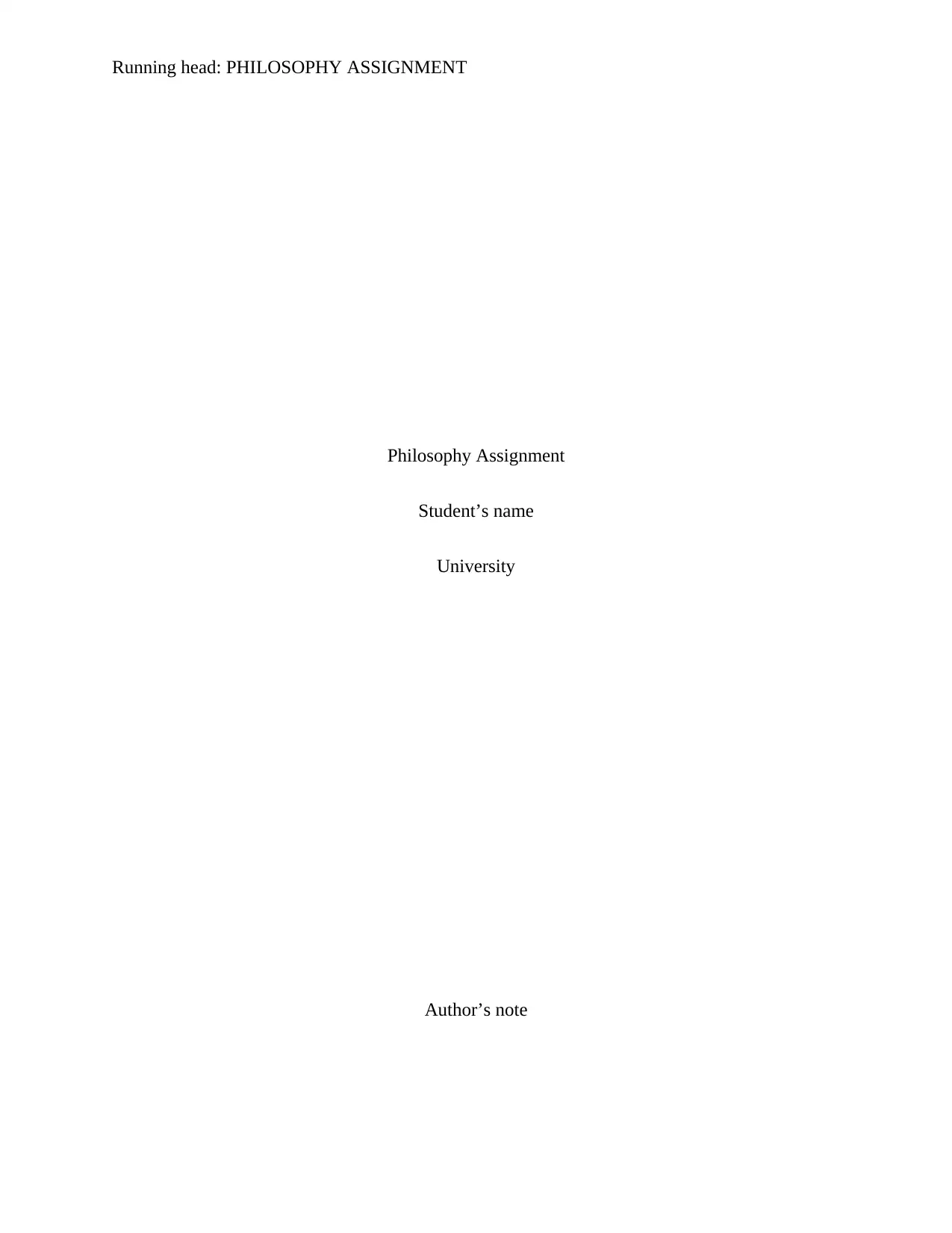
Running head: PHILOSOPHY ASSIGNMENT
Philosophy Assignment
Student’s name
University
Author’s note
Philosophy Assignment
Student’s name
University
Author’s note
Paraphrase This Document
Need a fresh take? Get an instant paraphrase of this document with our AI Paraphraser
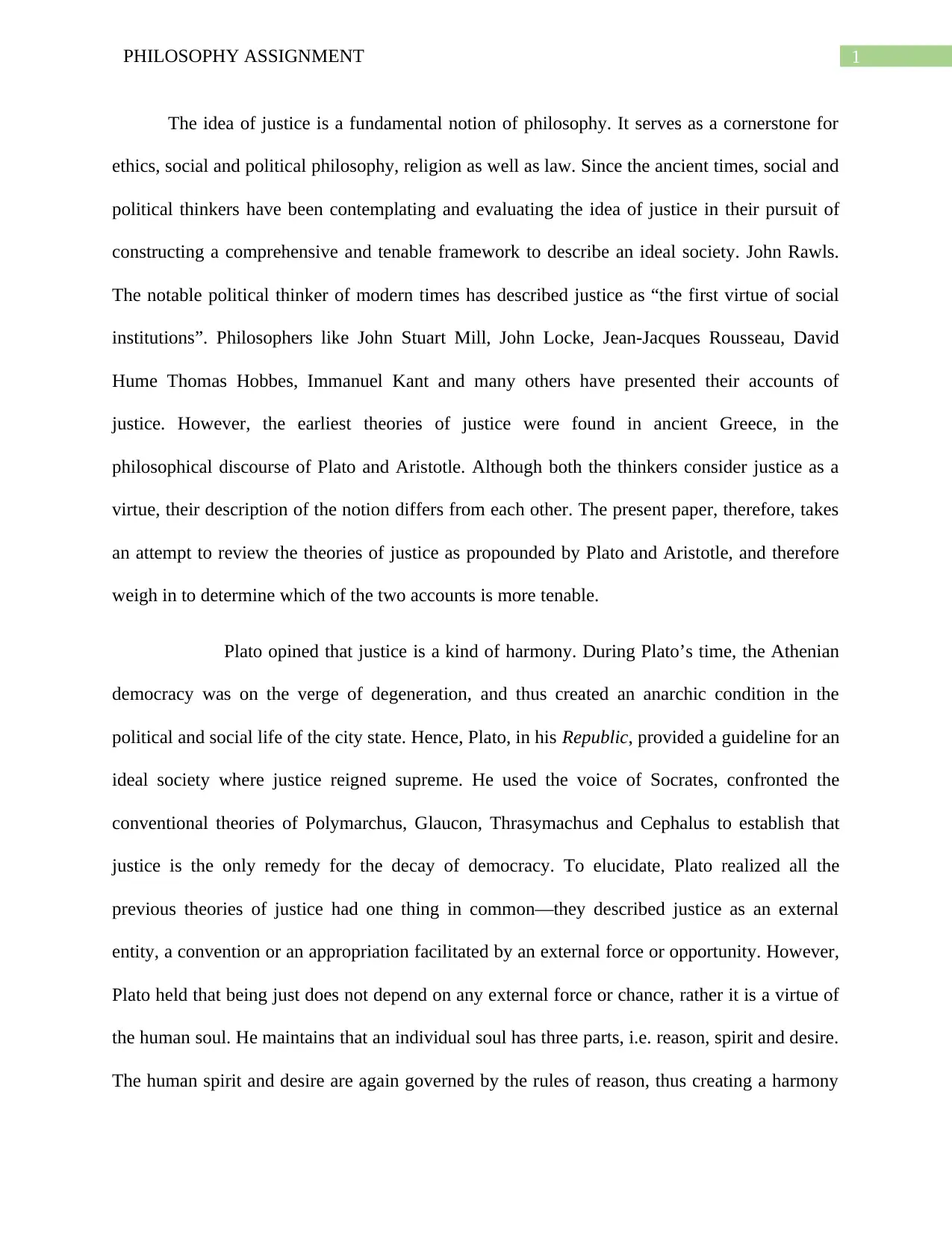
1PHILOSOPHY ASSIGNMENT
The idea of justice is a fundamental notion of philosophy. It serves as a cornerstone for
ethics, social and political philosophy, religion as well as law. Since the ancient times, social and
political thinkers have been contemplating and evaluating the idea of justice in their pursuit of
constructing a comprehensive and tenable framework to describe an ideal society. John Rawls.
The notable political thinker of modern times has described justice as “the first virtue of social
institutions”. Philosophers like John Stuart Mill, John Locke, Jean-Jacques Rousseau, David
Hume Thomas Hobbes, Immanuel Kant and many others have presented their accounts of
justice. However, the earliest theories of justice were found in ancient Greece, in the
philosophical discourse of Plato and Aristotle. Although both the thinkers consider justice as a
virtue, their description of the notion differs from each other. The present paper, therefore, takes
an attempt to review the theories of justice as propounded by Plato and Aristotle, and therefore
weigh in to determine which of the two accounts is more tenable.
Plato opined that justice is a kind of harmony. During Plato’s time, the Athenian
democracy was on the verge of degeneration, and thus created an anarchic condition in the
political and social life of the city state. Hence, Plato, in his Republic, provided a guideline for an
ideal society where justice reigned supreme. He used the voice of Socrates, confronted the
conventional theories of Polymarchus, Glaucon, Thrasymachus and Cephalus to establish that
justice is the only remedy for the decay of democracy. To elucidate, Plato realized all the
previous theories of justice had one thing in common—they described justice as an external
entity, a convention or an appropriation facilitated by an external force or opportunity. However,
Plato held that being just does not depend on any external force or chance, rather it is a virtue of
the human soul. He maintains that an individual soul has three parts, i.e. reason, spirit and desire.
The human spirit and desire are again governed by the rules of reason, thus creating a harmony
The idea of justice is a fundamental notion of philosophy. It serves as a cornerstone for
ethics, social and political philosophy, religion as well as law. Since the ancient times, social and
political thinkers have been contemplating and evaluating the idea of justice in their pursuit of
constructing a comprehensive and tenable framework to describe an ideal society. John Rawls.
The notable political thinker of modern times has described justice as “the first virtue of social
institutions”. Philosophers like John Stuart Mill, John Locke, Jean-Jacques Rousseau, David
Hume Thomas Hobbes, Immanuel Kant and many others have presented their accounts of
justice. However, the earliest theories of justice were found in ancient Greece, in the
philosophical discourse of Plato and Aristotle. Although both the thinkers consider justice as a
virtue, their description of the notion differs from each other. The present paper, therefore, takes
an attempt to review the theories of justice as propounded by Plato and Aristotle, and therefore
weigh in to determine which of the two accounts is more tenable.
Plato opined that justice is a kind of harmony. During Plato’s time, the Athenian
democracy was on the verge of degeneration, and thus created an anarchic condition in the
political and social life of the city state. Hence, Plato, in his Republic, provided a guideline for an
ideal society where justice reigned supreme. He used the voice of Socrates, confronted the
conventional theories of Polymarchus, Glaucon, Thrasymachus and Cephalus to establish that
justice is the only remedy for the decay of democracy. To elucidate, Plato realized all the
previous theories of justice had one thing in common—they described justice as an external
entity, a convention or an appropriation facilitated by an external force or opportunity. However,
Plato held that being just does not depend on any external force or chance, rather it is a virtue of
the human soul. He maintains that an individual soul has three parts, i.e. reason, spirit and desire.
The human spirit and desire are again governed by the rules of reason, thus creating a harmony
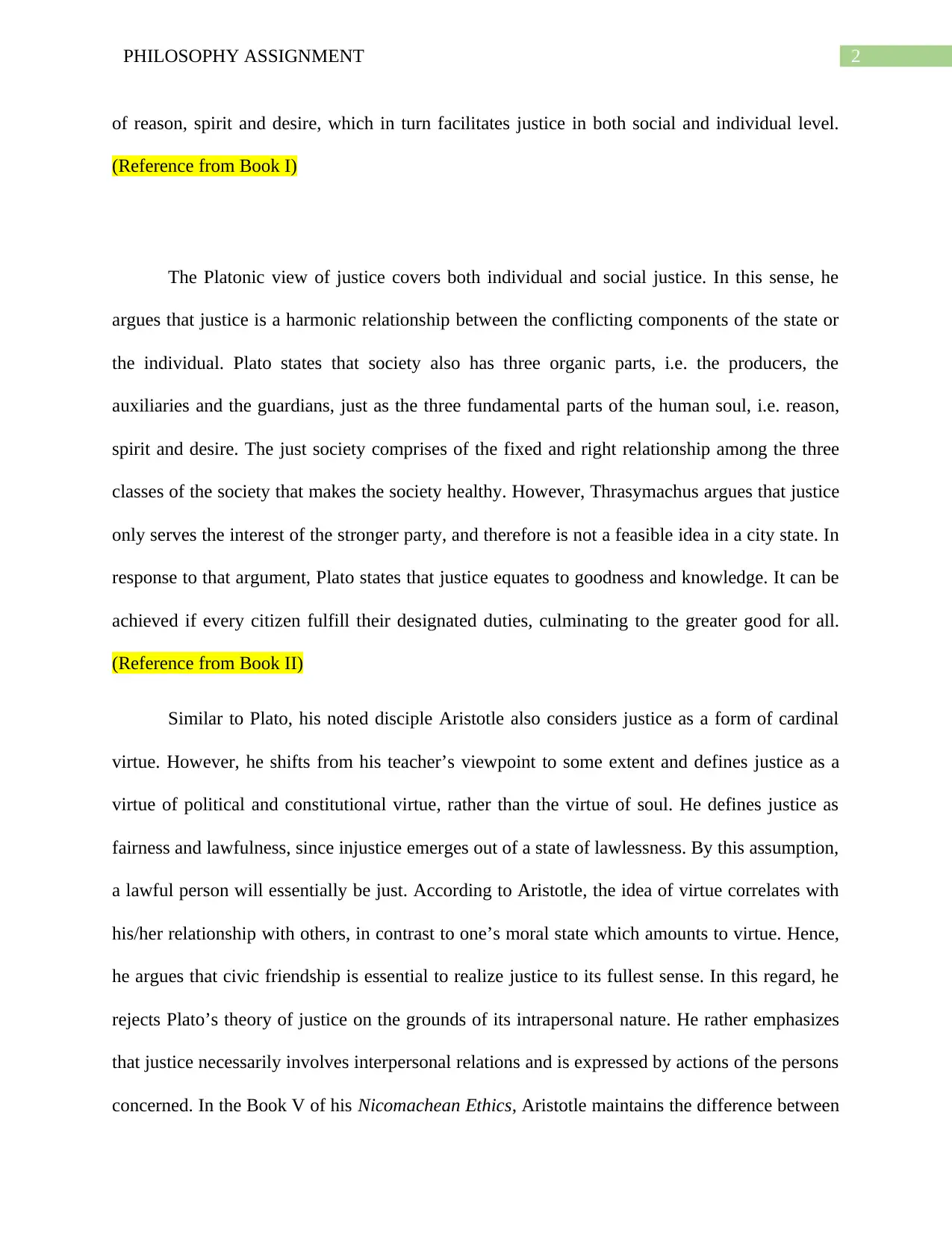
2PHILOSOPHY ASSIGNMENT
of reason, spirit and desire, which in turn facilitates justice in both social and individual level.
(Reference from Book I)
The Platonic view of justice covers both individual and social justice. In this sense, he
argues that justice is a harmonic relationship between the conflicting components of the state or
the individual. Plato states that society also has three organic parts, i.e. the producers, the
auxiliaries and the guardians, just as the three fundamental parts of the human soul, i.e. reason,
spirit and desire. The just society comprises of the fixed and right relationship among the three
classes of the society that makes the society healthy. However, Thrasymachus argues that justice
only serves the interest of the stronger party, and therefore is not a feasible idea in a city state. In
response to that argument, Plato states that justice equates to goodness and knowledge. It can be
achieved if every citizen fulfill their designated duties, culminating to the greater good for all.
(Reference from Book II)
Similar to Plato, his noted disciple Aristotle also considers justice as a form of cardinal
virtue. However, he shifts from his teacher’s viewpoint to some extent and defines justice as a
virtue of political and constitutional virtue, rather than the virtue of soul. He defines justice as
fairness and lawfulness, since injustice emerges out of a state of lawlessness. By this assumption,
a lawful person will essentially be just. According to Aristotle, the idea of virtue correlates with
his/her relationship with others, in contrast to one’s moral state which amounts to virtue. Hence,
he argues that civic friendship is essential to realize justice to its fullest sense. In this regard, he
rejects Plato’s theory of justice on the grounds of its intrapersonal nature. He rather emphasizes
that justice necessarily involves interpersonal relations and is expressed by actions of the persons
concerned. In the Book V of his Nicomachean Ethics, Aristotle maintains the difference between
of reason, spirit and desire, which in turn facilitates justice in both social and individual level.
(Reference from Book I)
The Platonic view of justice covers both individual and social justice. In this sense, he
argues that justice is a harmonic relationship between the conflicting components of the state or
the individual. Plato states that society also has three organic parts, i.e. the producers, the
auxiliaries and the guardians, just as the three fundamental parts of the human soul, i.e. reason,
spirit and desire. The just society comprises of the fixed and right relationship among the three
classes of the society that makes the society healthy. However, Thrasymachus argues that justice
only serves the interest of the stronger party, and therefore is not a feasible idea in a city state. In
response to that argument, Plato states that justice equates to goodness and knowledge. It can be
achieved if every citizen fulfill their designated duties, culminating to the greater good for all.
(Reference from Book II)
Similar to Plato, his noted disciple Aristotle also considers justice as a form of cardinal
virtue. However, he shifts from his teacher’s viewpoint to some extent and defines justice as a
virtue of political and constitutional virtue, rather than the virtue of soul. He defines justice as
fairness and lawfulness, since injustice emerges out of a state of lawlessness. By this assumption,
a lawful person will essentially be just. According to Aristotle, the idea of virtue correlates with
his/her relationship with others, in contrast to one’s moral state which amounts to virtue. Hence,
he argues that civic friendship is essential to realize justice to its fullest sense. In this regard, he
rejects Plato’s theory of justice on the grounds of its intrapersonal nature. He rather emphasizes
that justice necessarily involves interpersonal relations and is expressed by actions of the persons
concerned. In the Book V of his Nicomachean Ethics, Aristotle maintains the difference between
⊘ This is a preview!⊘
Do you want full access?
Subscribe today to unlock all pages.

Trusted by 1+ million students worldwide
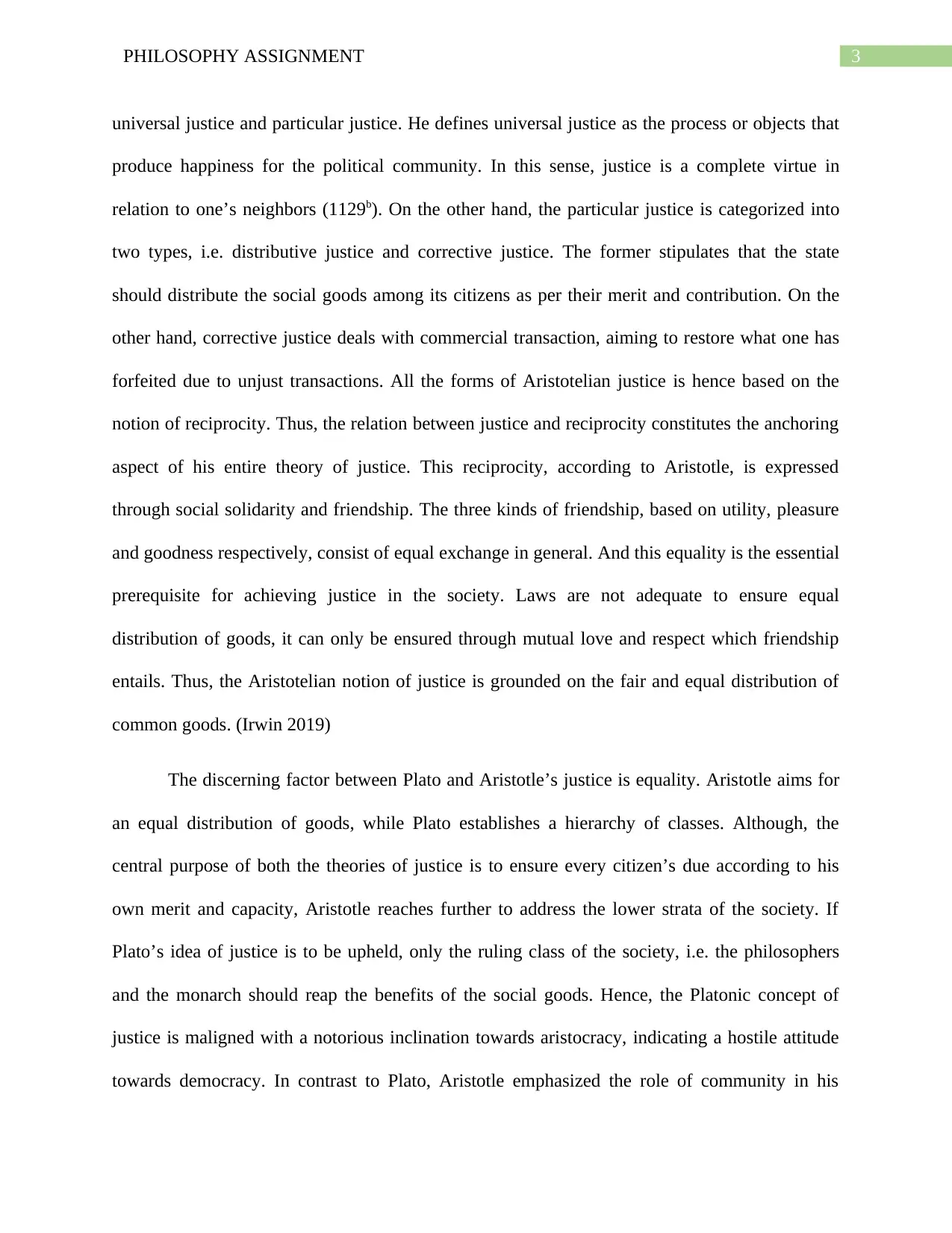
3PHILOSOPHY ASSIGNMENT
universal justice and particular justice. He defines universal justice as the process or objects that
produce happiness for the political community. In this sense, justice is a complete virtue in
relation to one’s neighbors (1129b). On the other hand, the particular justice is categorized into
two types, i.e. distributive justice and corrective justice. The former stipulates that the state
should distribute the social goods among its citizens as per their merit and contribution. On the
other hand, corrective justice deals with commercial transaction, aiming to restore what one has
forfeited due to unjust transactions. All the forms of Aristotelian justice is hence based on the
notion of reciprocity. Thus, the relation between justice and reciprocity constitutes the anchoring
aspect of his entire theory of justice. This reciprocity, according to Aristotle, is expressed
through social solidarity and friendship. The three kinds of friendship, based on utility, pleasure
and goodness respectively, consist of equal exchange in general. And this equality is the essential
prerequisite for achieving justice in the society. Laws are not adequate to ensure equal
distribution of goods, it can only be ensured through mutual love and respect which friendship
entails. Thus, the Aristotelian notion of justice is grounded on the fair and equal distribution of
common goods. (Irwin 2019)
The discerning factor between Plato and Aristotle’s justice is equality. Aristotle aims for
an equal distribution of goods, while Plato establishes a hierarchy of classes. Although, the
central purpose of both the theories of justice is to ensure every citizen’s due according to his
own merit and capacity, Aristotle reaches further to address the lower strata of the society. If
Plato’s idea of justice is to be upheld, only the ruling class of the society, i.e. the philosophers
and the monarch should reap the benefits of the social goods. Hence, the Platonic concept of
justice is maligned with a notorious inclination towards aristocracy, indicating a hostile attitude
towards democracy. In contrast to Plato, Aristotle emphasized the role of community in his
universal justice and particular justice. He defines universal justice as the process or objects that
produce happiness for the political community. In this sense, justice is a complete virtue in
relation to one’s neighbors (1129b). On the other hand, the particular justice is categorized into
two types, i.e. distributive justice and corrective justice. The former stipulates that the state
should distribute the social goods among its citizens as per their merit and contribution. On the
other hand, corrective justice deals with commercial transaction, aiming to restore what one has
forfeited due to unjust transactions. All the forms of Aristotelian justice is hence based on the
notion of reciprocity. Thus, the relation between justice and reciprocity constitutes the anchoring
aspect of his entire theory of justice. This reciprocity, according to Aristotle, is expressed
through social solidarity and friendship. The three kinds of friendship, based on utility, pleasure
and goodness respectively, consist of equal exchange in general. And this equality is the essential
prerequisite for achieving justice in the society. Laws are not adequate to ensure equal
distribution of goods, it can only be ensured through mutual love and respect which friendship
entails. Thus, the Aristotelian notion of justice is grounded on the fair and equal distribution of
common goods. (Irwin 2019)
The discerning factor between Plato and Aristotle’s justice is equality. Aristotle aims for
an equal distribution of goods, while Plato establishes a hierarchy of classes. Although, the
central purpose of both the theories of justice is to ensure every citizen’s due according to his
own merit and capacity, Aristotle reaches further to address the lower strata of the society. If
Plato’s idea of justice is to be upheld, only the ruling class of the society, i.e. the philosophers
and the monarch should reap the benefits of the social goods. Hence, the Platonic concept of
justice is maligned with a notorious inclination towards aristocracy, indicating a hostile attitude
towards democracy. In contrast to Plato, Aristotle emphasized the role of community in his
Paraphrase This Document
Need a fresh take? Get an instant paraphrase of this document with our AI Paraphraser
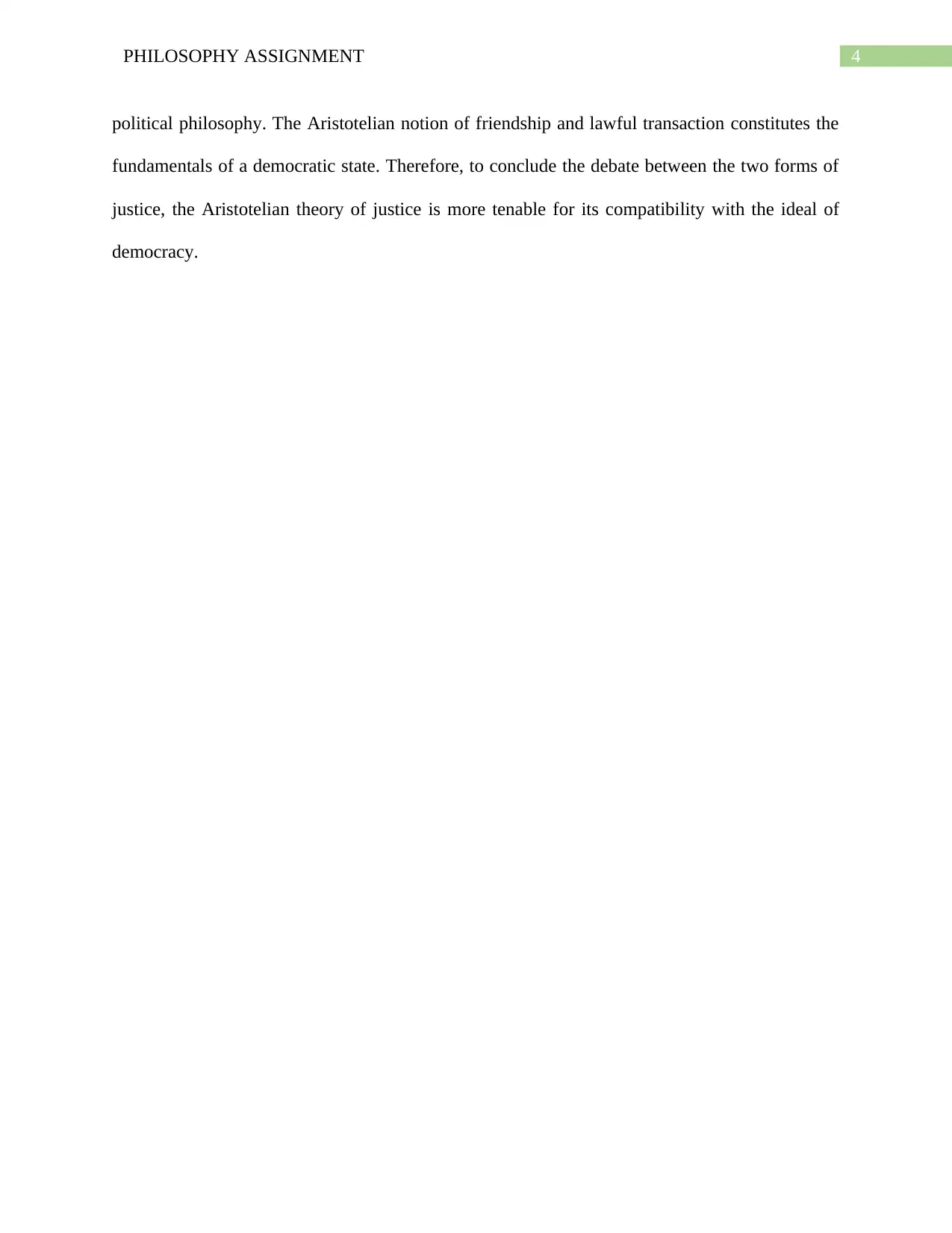
4PHILOSOPHY ASSIGNMENT
political philosophy. The Aristotelian notion of friendship and lawful transaction constitutes the
fundamentals of a democratic state. Therefore, to conclude the debate between the two forms of
justice, the Aristotelian theory of justice is more tenable for its compatibility with the ideal of
democracy.
political philosophy. The Aristotelian notion of friendship and lawful transaction constitutes the
fundamentals of a democratic state. Therefore, to conclude the debate between the two forms of
justice, the Aristotelian theory of justice is more tenable for its compatibility with the ideal of
democracy.
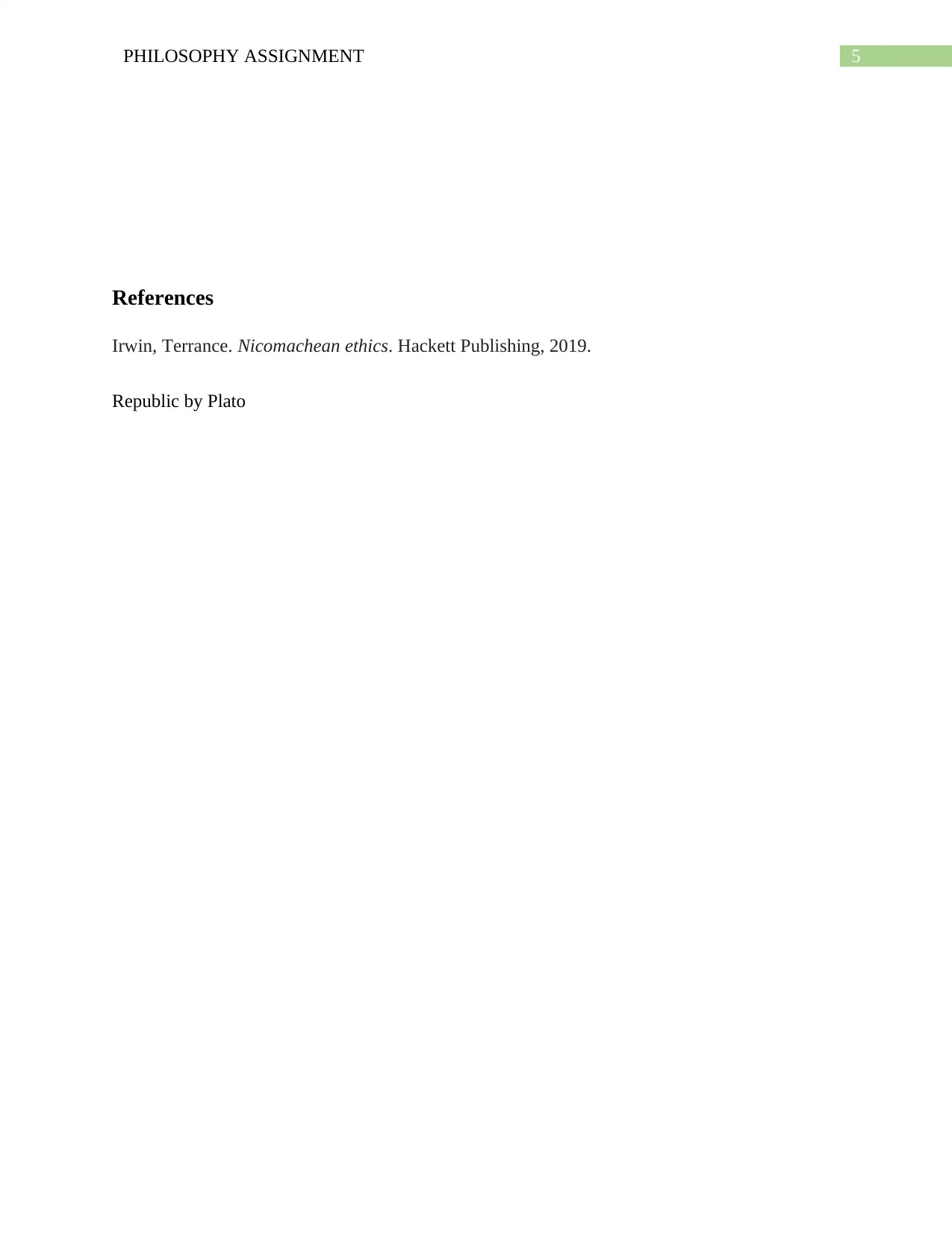
5PHILOSOPHY ASSIGNMENT
References
Irwin, Terrance. Nicomachean ethics. Hackett Publishing, 2019.
Republic by Plato
References
Irwin, Terrance. Nicomachean ethics. Hackett Publishing, 2019.
Republic by Plato
⊘ This is a preview!⊘
Do you want full access?
Subscribe today to unlock all pages.

Trusted by 1+ million students worldwide
1 out of 6
Related Documents
Your All-in-One AI-Powered Toolkit for Academic Success.
+13062052269
info@desklib.com
Available 24*7 on WhatsApp / Email
![[object Object]](/_next/static/media/star-bottom.7253800d.svg)
Unlock your academic potential
Copyright © 2020–2026 A2Z Services. All Rights Reserved. Developed and managed by ZUCOL.





